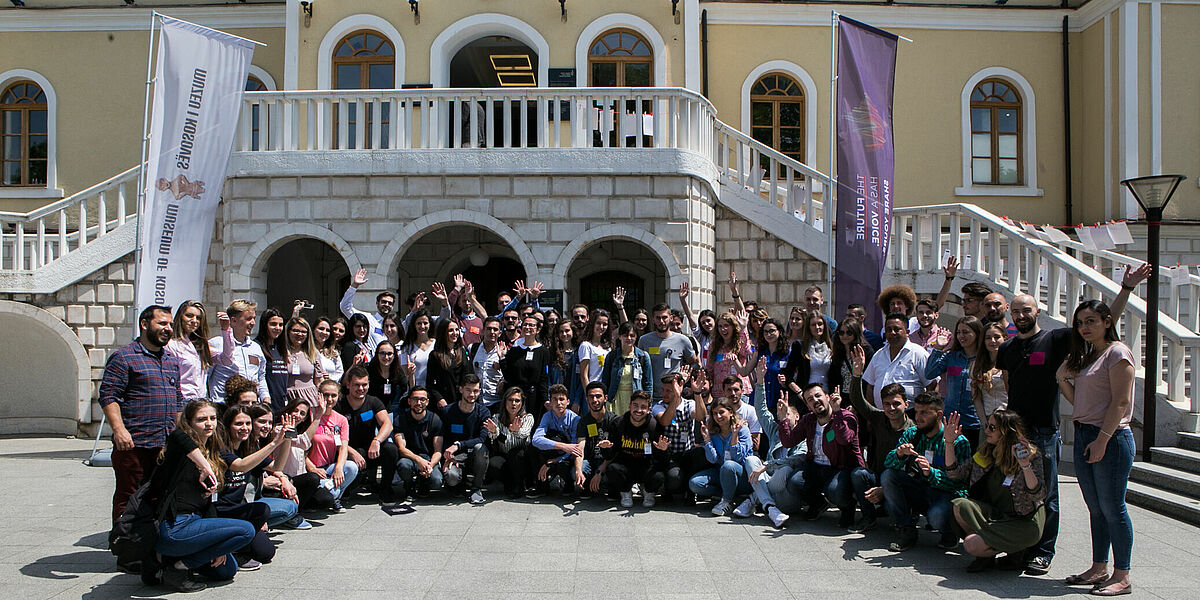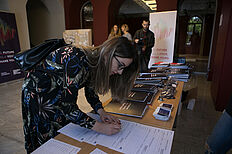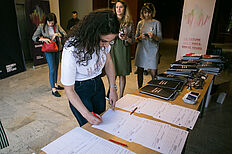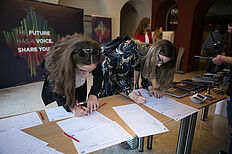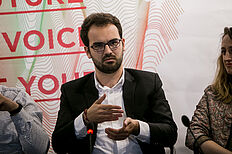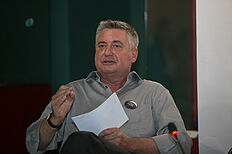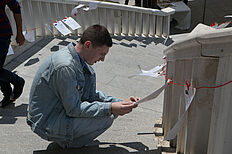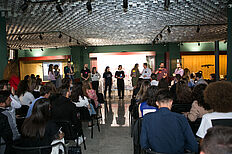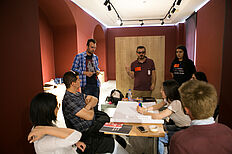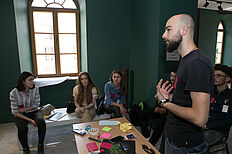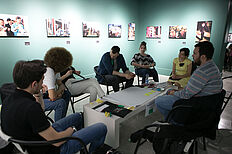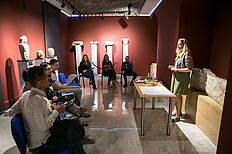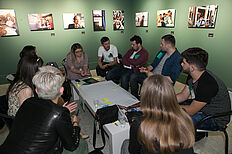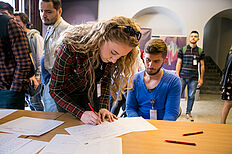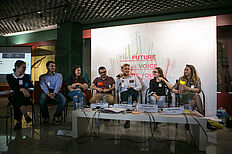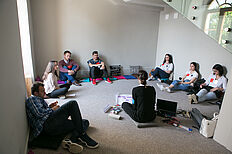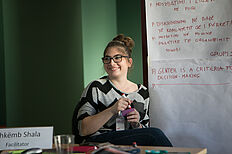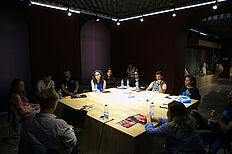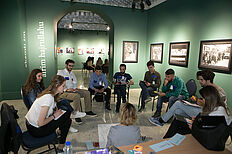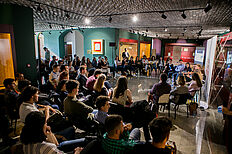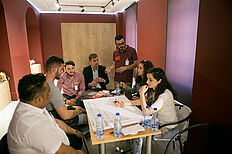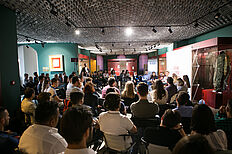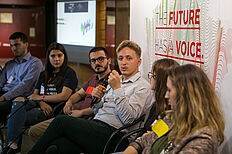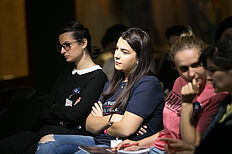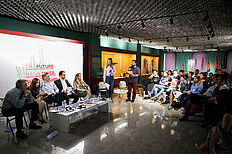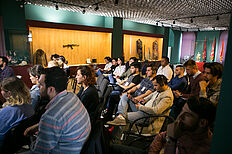Narrative Report on the Kosovo Youth Congress
The future has a voice. Give Your voice Power!
On 10 and 11 May 2018, at the National Museum of Kosovo in Pristina, there were about 100 youth organizations, youth networks, students’ organizations, and many volunteers that gathered for the first National Kosovo Youth Congress. In this Congress, the youth got together to discuss about major challenges that have an impact over them, including the four topics in particular: challenges in education, youth unemployment, youth participation in decision-making, and the social and cultural life of youth.
The purpose of the Youth Congress is to have a common voice among the youth of Kosovo, and about the main problems that affect them directly.
The objective of the discussions in the first Congress were to draw common recommendations and requests supported by competence and a vast number of youth organizations and networks.
"These are the two pillars on which strong interest groups shall be built, one is competence, and the other one is the number of persons that support these interest groups", said in his opening speech Mr. Frank Hantke, Country Director of FES.
The First Kosovo Youth Congress is supported by FES, and is organized in cooperation with youth organizations’ preparatory team: "Global Shaper Community Prishtina", "THY", "Ipsia Kosovo", "Lens", "Kosovar Youth Council" and "Alumni Club of the Internship Program of German Business", and other volunteers.
Dafina Peci from the Congress in Albania and Arbion Gashi from the Youth Council in Bavaria, Germany were here to share their support and experiences for this very initiative.
Main parts that ensure the continuity of the Youth Congress in Albania, created with the help from FES since 2013, are the internal democracy, impartiality from the governing authority, and the rotation and the changing of the members of the steering bodies of the Congress, as well as the topics which always are current. Arbion Gashi from the Youth Council in Bavaria, as a Chair of the Committee mentioned the importance of lobbying for the youth, organizing of activities with and for them, and reaching the unifying ideas for many youth. These practices were recommended as future guideline for the next Kosovo Youth Congress.
Organization of work for the purpose of the topic analyses – through the identification of pertinent challenges, requests and recommendations – was made possible by dividing the participants into working groups, and the group facilitators (volunteers) changed on rotation basis on every 45 minutes.
The discussions about the topics in education, unemployment among youth, participation in decision-making, and the social and culture life were held in working groups with 10 – 11 youth, with one facilitator per respective topic.
The random division into such working groups, by changing the facilitators and topics provided many possibilities for socializing between members of the groups, but also to comfortably analyze each and every topic without any concerns which turned to be even more productive. All the discussed comments and items, were written down and classified by the facilitators with the help from the participants, in 3 directions: identification of problems, presenting the requests and giving of recommendations.
The market of opportunities was a creative idea which was present during the two days of the Congress, and in the Museum premises many photos with descriptive texts were displayed in relation to missions, activities, and the work of youth organizations and networks, participating in this Congress.
The organization and the reaching of a common voice, requires social activities, therefore the first day, following the activities in the working groups was crowned with a performance from young artists, and the participants had the opportunity to get to know each other better.
The work on conclusions from the working groups during day one, was presented by the facilitators on the second day of the Congress, with the possibility provided for comments and questions from the audience during the open discussion part.
Agnesa Qerimi and Qëndresa Ibrahimi presented the area of education, and its main challenges were: non-implementation of laws, lack of proper infrastructure, curricula, outdated methodology and literature, lack of early vocational orientation and the sanctioning budgetary formula for the entire education system in Kosovo, which then ends up with a poor quality in education. The main recommendations introduced unanimously by the youth about poor quality of education were to increase cooperation between the stakeholders, implementation of legislation, capital and ethical investments in education, training, licensing and monitoring of teachers and professors, enhancing of professional schools, reviews, and better budget planning and allocation.
During the presentation of the conclusions about the topic of unemployment, the facilitators Avdyl Gashi and Dillon Berjani, explained that the challenging factors have been divided into 4 categories, starting from politics, economy, culture and the social aspect and the factors of education. The biggest problems were lined up among the political problems, economic, cultural and social. According to youth, unemployment exists due to lack of a strategy for creation of jobs because there is presence of corruption and nepotism, there is lack of information about the employment center and their work leaves room for major improvements, there is lack of jobs, inadequate national and local policies for small businesses, lack of investments in the profitable sector of agriculture, consumption orientation, lack of respect of rights at work, inadequate orientation in career for youth, generalization of skills without creating any professionals in respective areas and lack of partnership between the universities and companies and institutions in the area of practical work for the students.
Recommendations in this area have been divided into: political, economic, socio-cultural and educational. From the political aspect the recommendations suggested were: transparency in employment, functionalization of career centers, marketing and the restructuring of the employment centers and proper functioning of labor inspectorate. The most important recommendations for the economy were: support for domestic products, support for small businesses and creation of funds for subsidizing of SME-s. Recommendations for mitigating of unemployment, and from the cultural, social and educational aspect there was mentioning of awareness raising campaigns about the Labor Law, rights of workers, importance of professional vocational schools, stigmatized professions and harmonization of universities with relevant bodies to ensure practical work.
During the presentation of the topic: Participation of youth in decision-making, facilitators Vesa Ibrahimi and Shkëmb Shala, said that it is exactly this participation that is a precondition for the solution of all other problems in Kosovo. According to the groups, the biggest problems and challenges that impede the participation of youth in decision-making are lack of networking and information, low level of trust in institutions, clientelism, low finances, lack of awareness in the media and too complicated official ways of communication, and let alone the inclusion of youth in these bodies and structures that are supposed to represent and be the voice of youth. Recommendations from the Congress were very concrete, starting from the monitoring of youth organizations, creating of a budgetary line for youth, creation of a portal by the youth, political education starting at secondary education, proper managing of funds, transparency and changing of the existing structures by simplifying them and at the request for cooperation by the very youth organizations.
From the discussions on the social and culture life, facilitators Mjellma Doli and Visar Haxhifazliu explained that such activities are quite centralized in the capital of the country, and their absence is presented as low level of education, poor economic situation, lack of interest, information, funds through self-initiative. The proposals for the solving and tackling of these problems were: increase of extra-curricular activities from the very elementary education, awareness-raising campaigns for institutions and youth, opening of culture centers, decentralization of events and equality, their continuity and advocacy for the allocation of budget for municipalities and respective ministries for social and cultural life.
Following the presentation of the results from the working groups, discussion was opened for the continuation of the Kosovo Youth Congress, for possibilities of cooperation in the future, enlargement and inclusion of many youth organizations and networks who speak with one voice about their requests. The comments given by the participants most of the time were in relation to the continuing of the Congress, its action plan which expresses also the interest for the unification of the voice of the youth about unified requests, which in the future shall be translated into a future Youth Action plan.
The particular thing about the Congress was the location where discussions were held and where youth worked, in the National Museum, a place of culture and history. The museum in itself safeguards the knowledge of mankind throughout the ages. It is the history of social movements and of social changes that has taught us that the rights are not given, but are won, whereas critics without a unified action shall bring only viability for the very same situation, which we want to change. Therefore, the works of the first Kosovo Youth Congress at the museum were also aimed to visit the past in order to learn from it, but then move ahead from there, with one voice and united!
The future has got a voice. Give your Voice power!
Aurora Mullatahiri, Youth Congress reporter.
Friedrich-Ebert-Stiftung
Kosovo
Ul. Pashko Vasa 23
10000 Priština
Republika Kosovo


